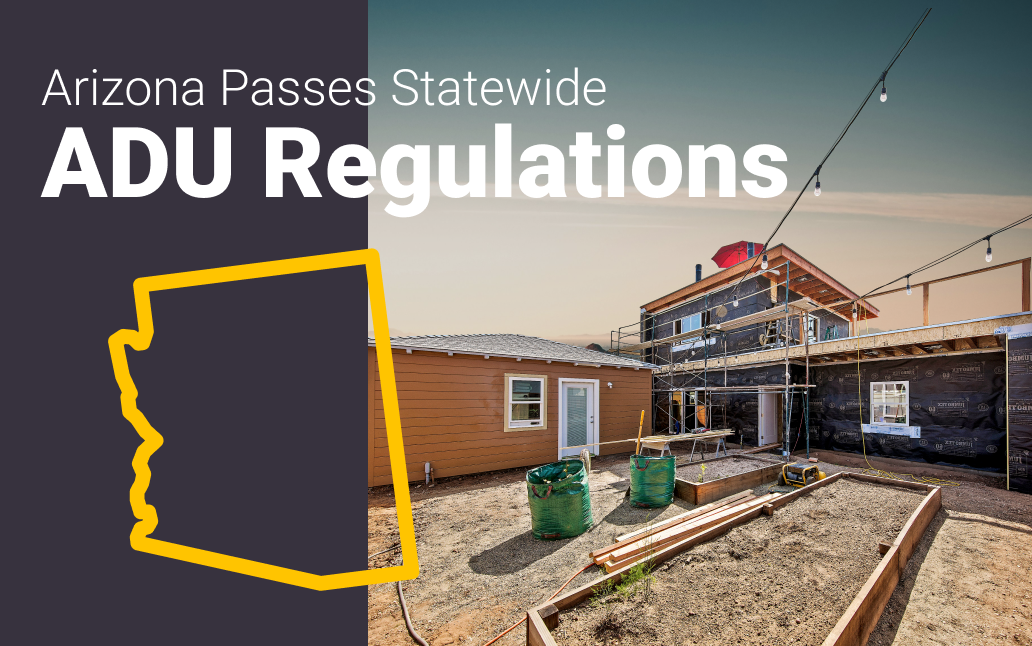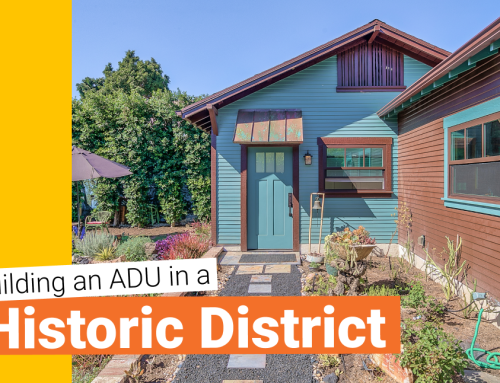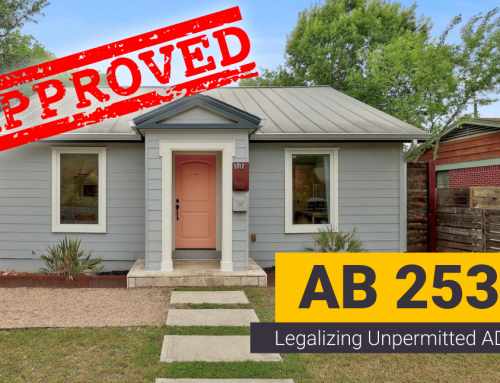Arizona joins the list of states to have statewide regulations for accessory dwelling units (ADUs), also commonly referred to as casitas, thanks to new Senate Bill 1415. This comes as no surprise. The state’s capital, Phoenix, passed its own ordinance late last year to allow backyard casitas as a response to the growing housing problem. Support for ADUs in Arizona has been prevalent for years now.
However, what is surprising is the strong opposition to this statewide bill from many cities, including Phoenix, the original supporter. Is this new bill a blessing or curse in disguise?
Let’s see why this new ADU bill has sparked such a heated debate.
Senate Bill 1415: Arizona ADU Regulations
SB 1415 requires all municipalities in Arizona with a population of at least 75,000 to adopt the state’s ADU regulations. These regulations would allow any single-family property to add at least one attached or detached ADU. Each restricted-affordable dwelling unit on the lot or parcel can have at least one extra accessory dwelling unit permitted for use. The ADU can be up to 75% of the gross floor area ratio of the main residence or 1,000 sq. ft., whichever is less.

No problem so far, but in addition to the above, SB 1415 also sets restrictions to what cities can or cannot require. This is standard practice when it comes to ADU regulations. California follows a similar format, but allows some wiggle room for cities that are more ADU friendly and want to loosen the regulations.
This has worked well so far in California, but many cities in Arizona are troubled by some of the restrictions.
Cities are not allowed to impose the following regulations:
- Prohibiting the use or advertising of single-family homes or ADUs for long-term rentals
- Requiring a pre-existing relationship between the occupant of the main home and the occupant of the ADU
- Prohibiting or requiring a kitchen in the ADU
- Requiring additional off-street parking for the ADU
- Requiring that the ADU match the exterior, roof pitch, and finishings of the main house
- Any regulations that are more restrictive than the regulations for the main residence with regard to height, setbacks, lot size, or lot coverage.
- Side and rear setbacks more than 5 ft.
Many of these city restrictions seem reasonable, such as prohibiting cities from mandating that the ADU match the design of the main home. However, there are some points that draw concern.
Where Cities Take Issue with the new Arizona ADU Regulations
While many municipalities remain big advocates for ADUs, even some of the biggest supporters think the state lawmakers need to go back the drawing board.
Everything BUT the Kitchen Sink

What caught many people off guard was the bullet point stating that cities cannot enforce a requirement for a kitchen within the ADU.
Traditionally, ADUs have served as long-term accommodations (3+ months), where a kitchen is deemed essential for sustained living. Restricting cities from mandating homeowners to incorporate a kitchen in their ADUs appears contradictory to the goal of expanding housing availability.
In fact, in many states, a unit without a kitchen wouldn’t even qualify as a legal dwelling unit and would not be deemed suitable for long-term housing.
Omitting a kitchen would also greatly limit the versatility of the ADU. Homeowners wanting to exclude the kitchen to cut costs on their ADU may find themselves limiting potential tenants or uses for the space. Additionally, it could diminish the overall value of the property, as a fully equipped ADU holds greater appeal and functionality in the rental market or for future resale.
If a homeowner decides to add a kitchen later, the new expansion can be complicated and more costly than if they had included a kitchen from the start.
Short-Term Rentals Remain
Many Arizona cities, including Phoenix, also take issue with the fact that the bill does not ban short-term rentals, or vacation rentals, for these ADUs. Residents worry that this could cause an influx of outside investors buying properties for renting. This scenario would not only constrict housing availability even further but also heighten the challenge for local residents seeking to buy homes.
Phoenix’s ADU ordinance directly banned short-term rentals for ADUs. While the state bill does not prohibit cities from banning short-term rentals, the bill could nullify the ordinance all-together.
Nick Ponder, a lobbyist for the Arizona League of Cities and Towns, notes that 26% of homes in Maricopa County are owned by outside investors. Similarly, 20% of homes in Sedona are short-term rentals. Ponder worries that the investment potential of ADUs coupled with the new loosened regulations could cause these numbers to skyrocket, further exacerbating the state’s housing crisis.
What SB 1415 Does Right

Despite the controversy surrounding SB 1415, it is important to acknowledge that the bill does address a critical need in Arizona. By allowing homeowners to add ADUs to their properties, the bill effectively increases the housing supply in the state. This could provide more affordable options for renters and help alleviate the housing crisis.
The bill also puts Arizona on track with other states like California that have recognized the role ADUs can play in addressing housing shortages. By enforcing statewide regulations, the bill ensures that all cities, regardless of their size (and stance on ADUs), have the ability to provide more housing options for their residents.
However, it is clear that the bill may benefit from further refinement to address the concerns raised by cities and to ensure that ADUs truly serve their intended purpose of providing affordable, long-term housing options.
Our Recommendation for Arizona Lawmakers
The impact of these new regulations on Phoenix’s housing landscape will be closely watched by all stakeholders. This is where our expertise comes into play. At Maxable, we’ve been deeply involved in shaping ADU regulations in California, and we’ve seen how these small housing units can have a big impact on a housing crisis. We’ve learned through experience what works, what doesn’t, and why.
The city of Phoenix and other cities have valid concerns about the potential implications of the new Arizona ADU regulations. The bill, while well-intentioned, could lead to an influx of outside investors buying properties for short-term rentals, further constricting the already limited housing availability.
Additionally, the prohibition on requiring a kitchen in the ADU is a concern. We urge lawmakers to think about the future tenants of these ADUs when writing the next ADU bill. Excluding such a fundamental aspect of living accommodations could significantly impact the livability and versatility of these units, potentially limiting their appeal and functionality for residents.
It’s crucial to strike a balance between regulatory flexibility and ensuring that ADUs meet basic standards for habitability and long-term occupancy.
While SB 1415 is a step in the right direction, it may need further refinement. The statewide regulations should enable cities to provide more housing options for their residents, but they should also ensure that these options are sustainable and beneficial to the local communities. It’s a delicate balance, but with careful consideration and ongoing dialogue between the state and the cities, it’s a balance that can be achieved.







